Brian’s story: From tragedy to triumph
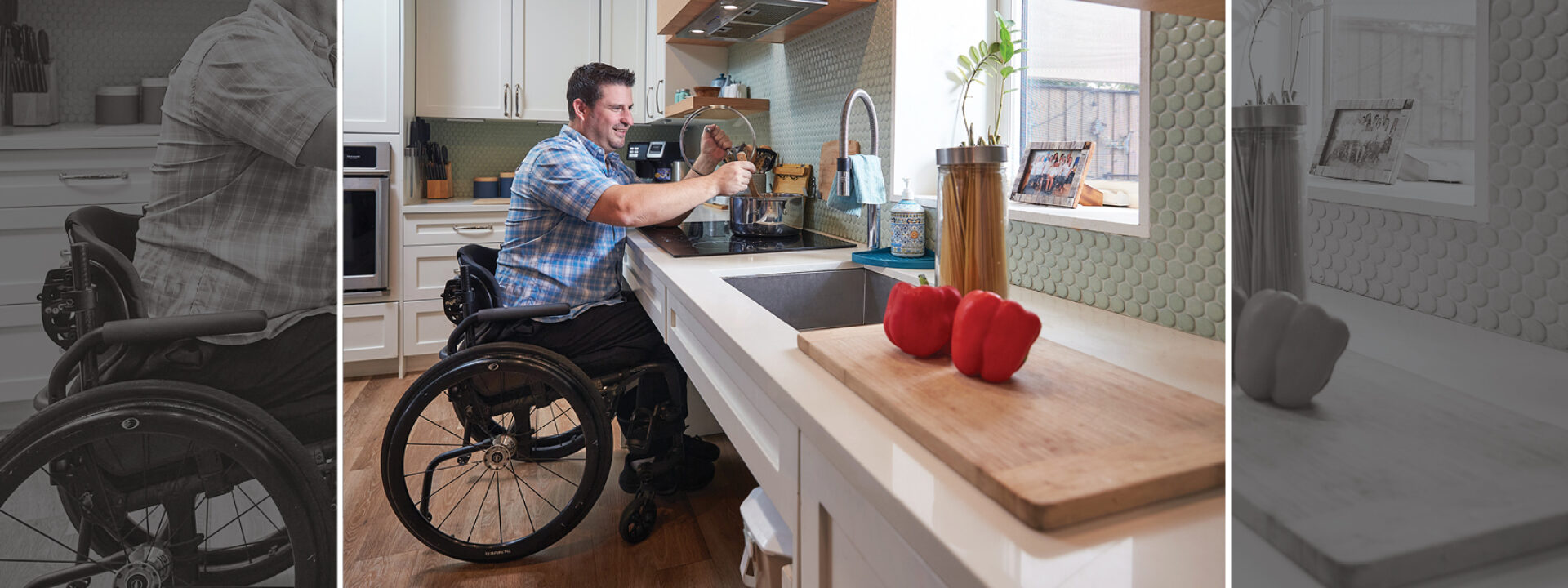
A family and its community united to beat the odds after a father's catastrophic injury.
Brian Campbell’s story could be called a tragedy. But it is better described as one of determination, love and hope. He’s a living testimony that when disaster strikes, you can overcome and move on with your life.
Campbell, a 46-year-old father of two, fell from a ladder while putting up Christmas lights on his Waterdown house in November 2017. He landed on the lawn.
“And thank God not on the car or concrete. I landed on my shoulder blades with enough force it took my whole body over my head. I was on the garage roof and not the high roof, which would have ended much worse. I wouldn’t be here now.”
Brian’s wife Claire was inside with their 11-month-old son, Charlie. (Emily, their five-year-old daughter, was in school at the time.)
“Charlie was having a nap when I heard the ladder come crashing down outside and Brian screaming,” says Claire. In an instant, the Campbells’ lives changed forever.
The force of the impact cracked the T12 vertebrae and ruptured his spinal cord.
Brian was in surgery for almost five hours, with doctors fusing three vertebrae with titanium screws to provide support.
He would spend four months in Hamilton General Hospital. With the prospect of a bleak Christmas in a hospital bed looming, the family experienced their first outpouring of community goodwill.
“We were trying to find a place where we could take Brian out for Christmas dinner with the family,” says Claire. “It was a big wish but seemed very unlikely.”
But Ronn Mattai, founder of former Locke Street eatery Mattson & Co. and Junction Events & Catering had heard about Brian’s accident and volunteered to cater Christmas dinner at the hospital where the family could all gather.
“We assumed he was going to bring dinner in plastic or foil containers,” says Claire. “But no, to our surprise and delight, he not only brought in food but also a server, linen tablecloths, dinner and wine. He laid out a whole table, table settings, decorations and dessert. Our parents and kids were there. There was so much food so we shared it with the nurses and hospital staff. And he wouldn’t take any money from us. It was simply amazing and heartwarming. A fully catered Christmas dinner event for us.”
It was a bright light in a rough time for the Campbells. Brian’s recovery was long and slow.
“Just sitting up properly and the blood pressure readjusting were significant challenges,” says Claire. “He came out of the hospital in February, then moved over to the rehab centre next door on Victoria Avenue. The HHS Regional Rehabilitation Centre professionals were amazing as they’re always running at 150 per cent all the time.”
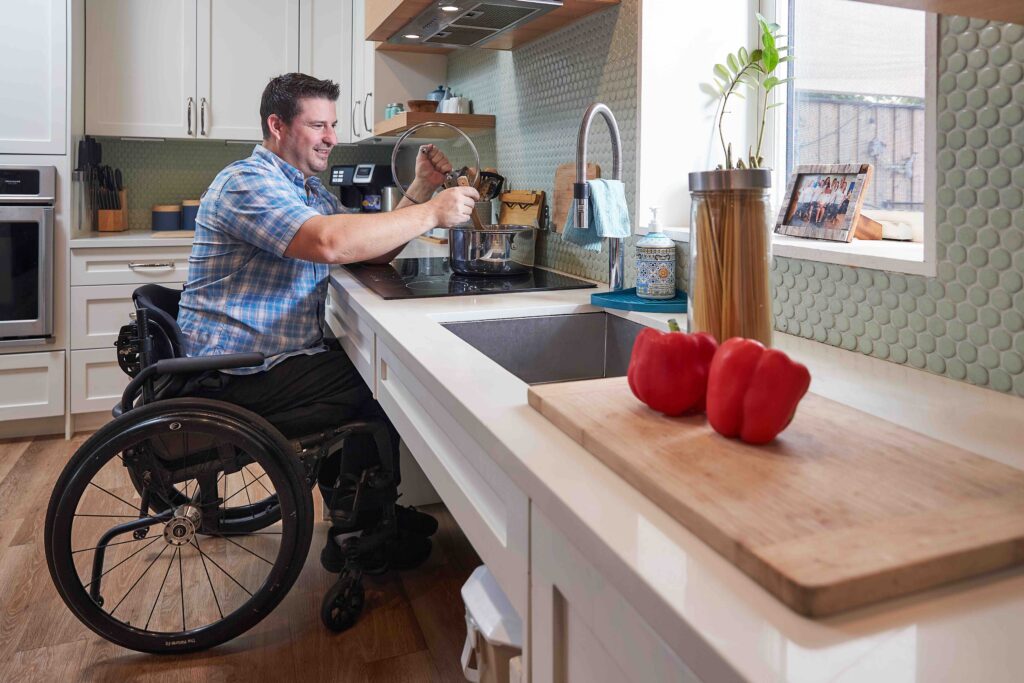
space for him to move around. Photo: Jon Evans
Rehabilitation
Rehabilitation is about getting a patient strong enough and skilled enough to return home and live with as much independence as possible.
“A spinal cord injury is a life-altering injury for most people,” says Mike Finlay, a physiotherapist working in outpatient spinal cord injury rehabilitation. “Brian was good. He was very grounded and focused on what he needed to do because there's a lot of burdens that kind of come along with a spinal cord injury.”
Along with learning to use mobility assistance devices, including a wheelchair, the hardest thing to deal with, says Brian, is relearning all the physical cues that your body tells you, including managing bowel and bladder issues.
“It is so difficult because you don’t have the same sensations or sometimes no sensations at all. You have to relearn the information your body is telling you.”
There was the added frustration of pressure sores from lying in bed so long that went on for almost eight months. Brian couldn’t do hydrotherapy because of the bed sores.
“I was in the gym twice a day for three hours at a time,” he says. “Getting closer to my discharge date – they asked if we needed support, a PSW, so we ended up taking all the help they offered. It took until April to get it all in order. The PSW came in twice a day to keep me functioning, a nurse came in once a day, and a proper hospital bed was provided. It was a time with so much change and so many challenges for all of us – me, Claire, our kids Emily and Charlie.”
Finding a new home
Claire recalls that when Brian got out of hospital in February 2018, it was the darkest time of their lives. The Campbells had to figure out what they would do with their home in Waterdown and how to accommodate the new reality for Brian.
“We had a quick estimate and it was going to cost at the very least, $15,000 to $20,000 to get a walkway/ramp done so Brian could get in the door,” says Claire. “Then there was the need for a porch lift, new concrete, and more, so we decided to sell it.”
Brian’s parents lived in east Burlington. They widened the home’s bathroom door and made other adjustments. The Campbells were there for 18 months.
“We looked everywhere for a house but they all needed so much work – renovations and accommodations for Brian to get around. We ended up buying a house on Beach Boulevard.”
The house had a ground-floor bedroom and bathroom that had already been renovated for a person with mobility challenges. The Campbells also bought the porch lift.
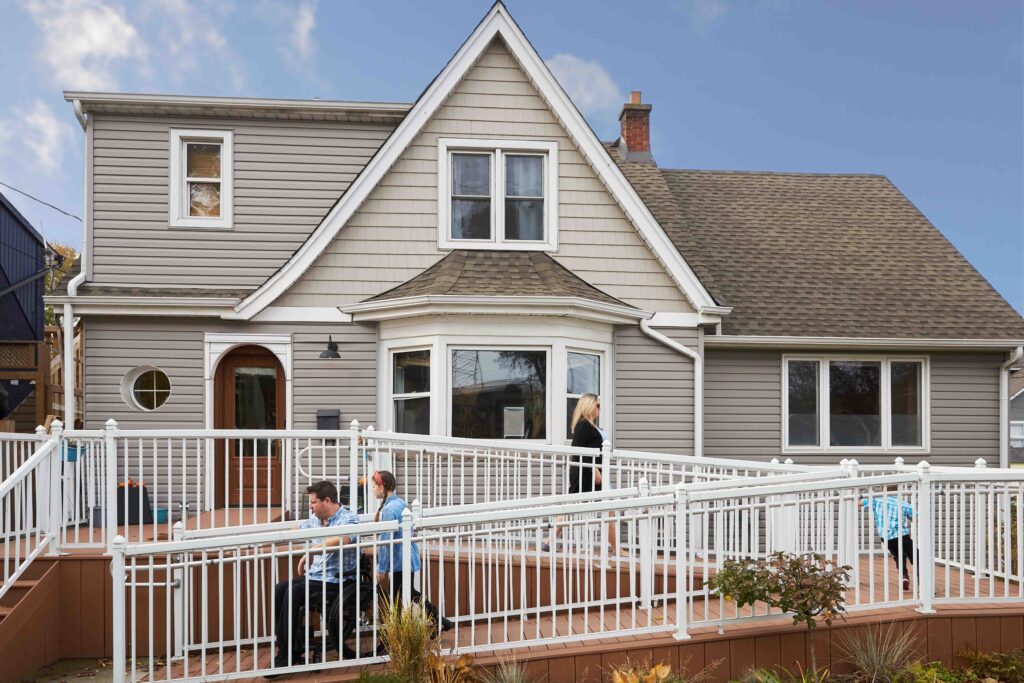
Returning to work
Brian has been the production manager and technical director at the University of Toronto’s Hart House Theatre since 2010. He wasn’t able to return to his job until about 18 months after his accident.
Campbell lauds his employer for putting in everything he needed, including door assists and a new ramp into the building.
“And not just for me. But for overall accessibility and that’s a good thing for anyone coming to the theatre who might need it.”
Regardless of the accommodations, Brian has had to change the way he works.
“I can get into the theatre but I can’t get onto the stage and have a look with my eyes at things, so I have to rely a lot on my crew,” he says. “Before my accident, I was very hands-on. If I didn’t plan something up to its minutia, I knew in the back of my mind, I could jump in and do something. So, I’ve had to do more day-to-day planning in advance. I have to think about things very differently and do a lot more delegating.”
Community support
The Campbells moved into their new home in August 2019, but there were still structural limitations and physical barriers for Brian.
Denise Zammit, one of Claire's friends, had heard HGTV was looking for families for a new TV home makeover show. She completed the application that got the Campbells selected. The TV crew was on-site doing measurements before the house deal even closed.
After two months of renovations, the Campbells moved back into their newly redesigned, renovated and fully accessible house in November 2019.
“Brian couldn't go upstairs to say goodnight to the kids,” says Zammit. “But he can now. They had put in a track to get him up the stairs. They had to change all the doors. Nothing was suitable to allow him to go upstairs and do things with the kids. He was a family man. Those kids are everything to him. And the kitchen was reconstructed and completely redesigned.”
Brian uses the lowered cupboards with drop-down shelves in the kitchen all the time. “It was a game changer for me – for someone who likes to cook. Now everything I need is accessible, it’s all right there for me.”
Campbell is also a big golfer and after the accident, he figured he was never going to be able to play again. But someone he knew said Flamborough Hills Golf Club had a Solo Rider, a single-rider car that is designed to travel on any part of the golf course, including tees and greens, without damaging the turf. It has hand controls and a swivel seat. And thanks to some lessons, Campbell was able to relearn how to swing his clubs.
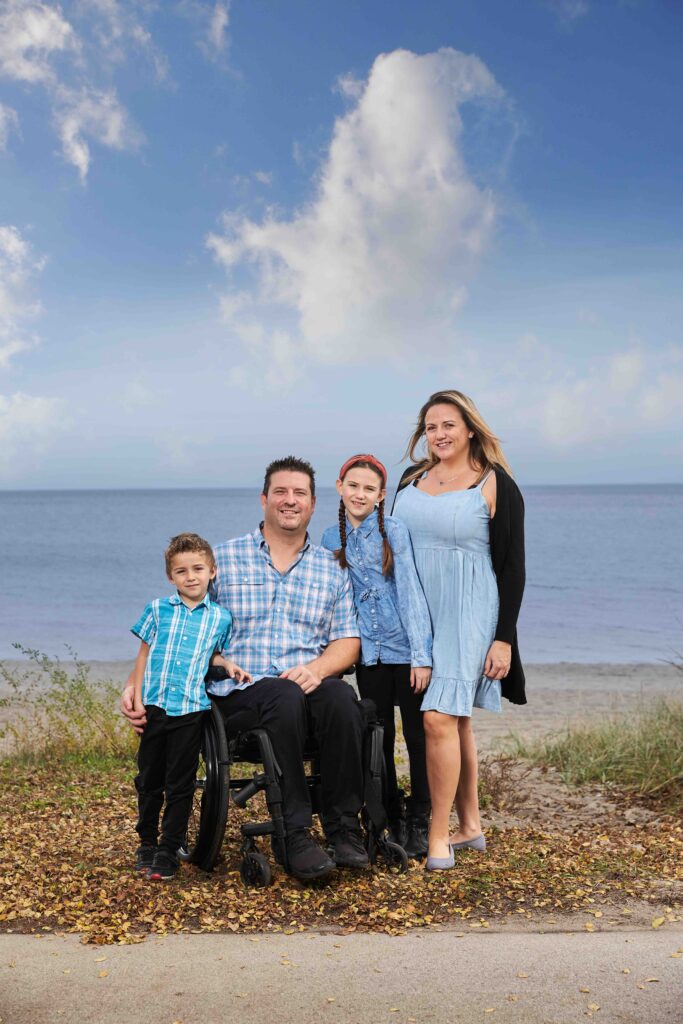
Fundraising
The Campbells have received an outpouring of support from their community, friends and from people they’ve never met. That included a church group that raised a couple of thousand dollars.
“Our friends and family came together and raised $25,000 to help us transition our lives. As for my outlook, I believe there’s still lots of good in this world, and all of this community outpouring and support really restores your faith in humanity.”
During their house renovations, the Campbells decided it was time to pay it forward and give back to the people and organizations that had done so much for them. And at the top of the list was Spinal Cord Injury Ontario (SCIO), which supports people with spinal cord injuries and their families in their transition back into the community. The organization provided air cushions for his hospital bed to relieve pressure sores, along with peer support and advice.
“They’re a great organization. They give so much help to people who have had these kinds of tragic accidents and injuries. Most people can’t afford the things they need to make their lives manageable, tolerable. They don’t have the health and medical benefits,” says Brian.
“Brian really exemplifies the spirit of our community,” says Dr. Stuart Howe, CEO of SCIO. “Brian and Claire are just a dynamic couple who really show what can be achieved and how you can live a very, very full life from a chair.”
Howe emphasizes that when it comes to this type of injury, knowledge is power.
“A spinal cord injury is really life-changing, a rollercoaster journey. We spend a lot of time on education and training for people with a spinal cord injury and their families and supporters. It's very specialized. And the more knowledge you have, the better the quality of life. And that's what it's all about. Now Brian is paying it forward.”
Brian organized a golf fundraiser for SCIO that raised about $20,000. Campbell also became a member of the SCIO southwestern executive committee. He wants to help others navigate a bureaucratic and complicated healthcare system.
“It’s not simple or straightforward. You can’t get anything done without help – trying to get things done on your own, just doesn’t happen, it’s nearly impossible. You need a physical therapist to sign off on certain things, you need an occupational therapist to sign off on other things, and if you don’t know this, it’s very difficult.”
The Campbells also participate in the Strides for the General 5K Run/Walk (now called Strides) at Hamilton’s Bayfront Park to raise money for new equipment.
“Rolling Thunder is our team,” says Brian. “We have 11 adults and seven kids on our team, including staff from the HHS rehab centre.”
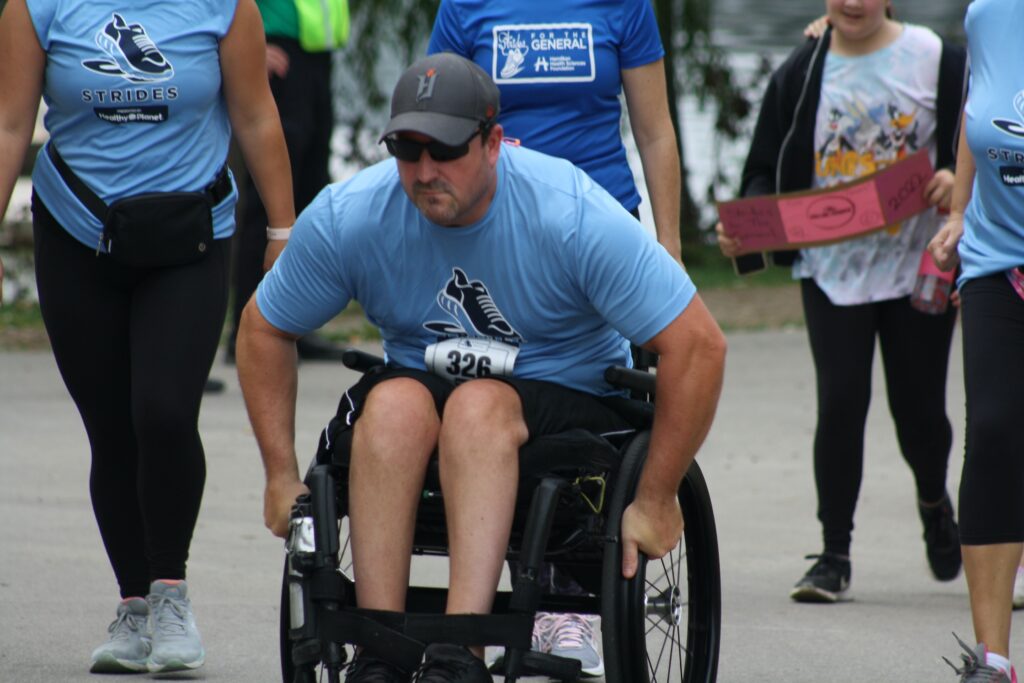
Accessibility
Getting around for everyday tasks is a challenge for those using a wheelchair.
“I have to plan every single move I make in a day so I know I’m not going to get caught out if I have to pick up the kids and there’s no ramp into the building. You go to a friend’s home for a visit – they say it’s all accessible but it is not. Doorways are often too narrow, or there’s small steps into a room, or you can’t get into the bathroom. Our society is full of challenges for people with physical mobility issues, people using wheelchairs. I have a lot of upper body mobility that allows me to plow through things but many others cannot.”
Brian was the catalyst to make Hamilton beaches accessible to people with wheelchairs. When the beach paths re-opened in 2020 (after COVID restrictions), Campbell contacted the City and his local councillor. He thought they were going to get right on it, but it stalled and another summer was wasted.
“The City didn’t have any idea of what to do. I did most of the research for them as the City bureaucracy is slow. We had to give them suggestions. We looked at what other cities have done. Port Colborne and Port Dalhousie gave us some ideas of what could be done to make the beach more accessible. They finally installed a special ramp, but we could use three or four of these ramps in different areas of the beach. Then the City of Burlington followed suit at Burlington Beach.”
Enjoying local beaches is tough but travelling to tropical ones has proven much worse. The family has been on four major vacations since Brian’s accident and each has featured inaccessible shuttle buses and promises of accessible hotel rooms that turn out to be empty when the family arrives.
“Accessibility is worse in the travel industry,” says Brian. “Every time we run into the same problems – mainly the sun destinations when you get outside of North America. Apparently, the need for an accessible room is treated no different than asking to be closer to your friends in the hotel or having an ocean view. It’s the same with Airbnb. You can’t depend on Airbnbs to have a destination that is accessible – it’s just not there.”
Finding strength
Brian’s advice to anyone in a similar life-altering situation is to take all the help that's offered. He and Claire have relied on a very strong, tight-knit group of friends and family.
“The initial human response to people offering you help in situations is, ‘No, no, I got it. We're good. We can do this. We can power through,’” he says. “You need to take the help because it's way more difficult than you think it is. Not necessarily from a physical standpoint but the emotional drain and the mental drain, not just on you, but your family and the people around you. Help is the key.”
Brian also strongly advocates speaking with a mental health professional.
“It's a big thing and you can't do it on your own. Even the strongest of people need help. I recognized that right away when I was still in the hospital. One of the first things I did was ask my doctor for a referral to a mental health professional, even if it's just for reassurance or just a touchstone of some sort. Claire and the kids have been amazing in that respect for me as a sense of support and being able to keep me grounded. But to have somebody who's trained to deal in somebody's mental health really helps. And they're able to recognize the signs that may be taking (you) down a darker path.”
Ultimately, Brian has what he needs right at home.
“We’re a very strong family ourselves, the kids help us get through. Claire is definitely the driving force behind everything we do. We’re a good team. Claire reminds me all the time about how inspirational I am for other people but I don’t see it that way. I’m just living my life and I’m still enjoying my job. Other than regular day-to-day grind stuff, I couldn’t imagine myself doing anything else.”
Canadians living with disabilities
(Source: Statistics Canada, 2017; Canadian Human Rights Commission, Roadblocks on the career path: Challenges faced by persons with disabilities in employment)
In Canada, the rights of persons with disabilities are enshrined in the Canadian Human Rights Act, in provincial and territorial human rights codes, and in the Canadian Charter of Rights and Freedoms. Federal, territorial and provincial human rights laws, which apply to the public and private sectors and prohibit discrimination on grounds such as disability in regard to employment, the provision of goods, services and facilities customarily available to the public, and accommodation.
In 2017, 22 per cent of the Canadian population aged 15 years and over – or about 6.25 million individuals – had one or more disabilities. Across Canada, nearly 30 per cent of persons with disabilities report having asked for workplace accommodation that was not made available, and at least 40 per cent of persons with disabilities report feeling that their employer considers them disadvantaged because of their disability.
The top five most common disabilities in Canada are pain-related, flexibility, mobility, mental health and sight.
Disability by age (of all persons with disability (15+ years)
- 25-64 years – 20% (3,727,920)
- 65+ years – 37.8% (1,972,310)
- 75+ years – 47.4% (935,730)
Severity of disability (of all persons with disability, (15+ years)
- Mild — 37.2%
- Moderate — 19.9%
- Severe — 20.7%
- Very severe — 22.1%
Ontario cities
The Hamilton Census Metropolitan Area has 166,500 persons with various disabilities or 27.7% of the total population (15+ years). That puts the city at No. 5 in Ontario.
- Belleville — 43.5%
- Peterborough _ 32.8%
- Kingston — 31.1%
- St. Catharines-Niagara — 28.9%
- Hamilton — 27.7%
- London 26.8%
- Greater Sudbury — 26.2%
- Brantford — 25.9%
- Ottawa — 21.1%
- Kitchener-Cambridge-Waterloo — 20.8%
- Toronto — 20.0%















